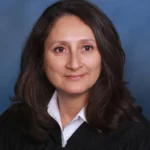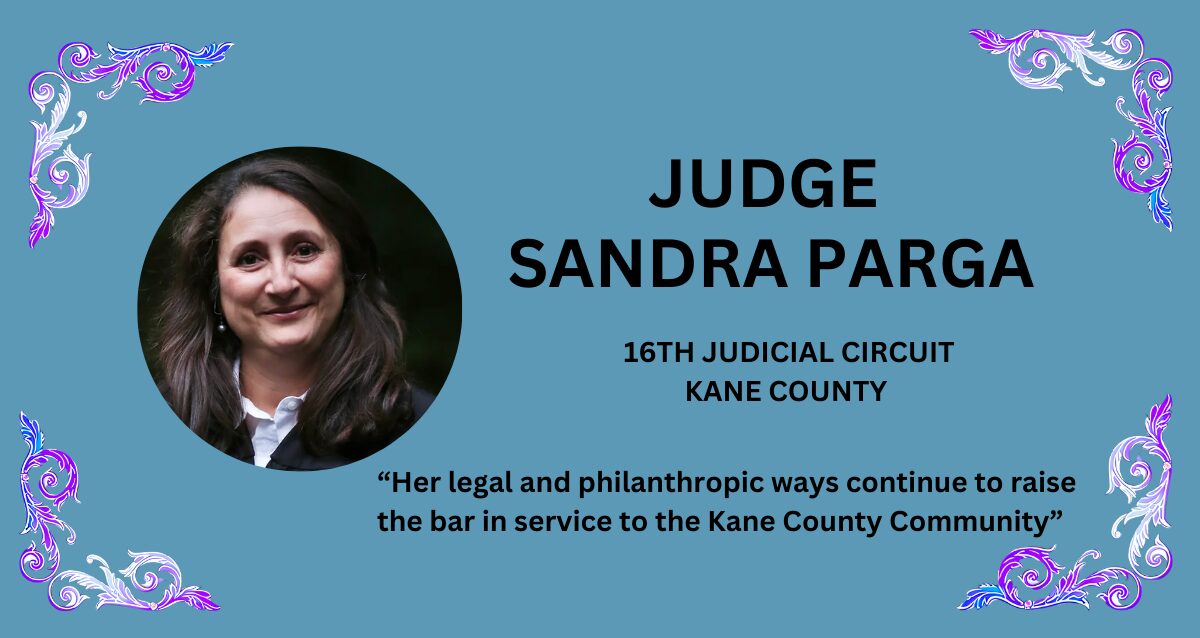(Linda Willet and Sylvia Marshall, interviewers)
Judge Sandra Parga is a member of KCDW who is currently running for circuit judge in the 4th Judicial Subcircuit. Currently, she is an associate judge assigned to Juvenile Court. We asked about the differences between associate and circuit court judges. Associate judges apply for the position and are appointed by the elected circuit court judges to a four-year term. They are assigned to hear felony, misdemeanor, and civil cases. Circuit judges are elected by the voters to a six-year term. They also hear felony, misdemeanor, and civil cases but have the additional duties of appointing the Chief Public Defender, Director of Court Services, and Director of the Kane County Diagnostic Center. They are also instrumental in shaping policies that impact litigants in our court system.

Judge Parga was the first Latina judge in Kane County when she was appointed in 2017. She talked about the importance of not giving up on your goals and dreams, no matter how long it takes, and said that there is more emphasis on diversity and opportunities for women during the last seven to ten years. Before her appointment, she practiced civil, criminal, and family law for 23 years, which included being a staff attorney at Prairie State Legal Services, followed by working as an assistant public defender in Kane County, and being a managing partner in a law firm. She also volunteered at the Prairie State Spanish Divorce Clinic for seven years. These years gave her valuable experience in different areas of the law and also allowed her to meet other Kane County lawyers and judges.
We asked Judge Parga if she always wanted to be a judge. She said she had not thought about it as a child, but from the time she was a young child, her parents told her that she had to go to college. However, she said that she was an average student, and the school guidance counselor recommended that she go to beauty school when Judge Parga took a career test. Her parents had migrated to the U.S. from Mexico as teenagers with their parents, and they did not agree with the guidance counselor and told Sandra that she was going to college. Fortunately, Sandra loved English class, and a young English teacher took Sandra under her wing and told her that she would teach her the formula for writing papers. That formula gave Sandra the ability and confidence to be successful and apply to college. She went on to major in English at DePaul, graduating with honors in three years. When she graduated, she received information in the mail from Cornell Law School and applied and was accepted at the law school. At Cornell, she realized that she was surrounded by students from prep schools and prestigious universities, and she worked hard to make good grades. This experience helped Judge Parga to realize that words are powerful and what you say to juveniles can give them confidence and the belief in themselves to work hard and change their lives.
Judge Parga’s ultimate goal was to become a judge, and from 2006 to 2017, she completed the application and interview process when an opening would occur. Often, there were only a few positions available. She had just about given up on reaching that goal after applying for 11 years, but she decided in 2017 that she would apply one more time to be a judge. And she received her appointment that year.
As a judge, she has impacted not only the lives of juveniles but also the lives of adults in the court system. She was instrumental in making sure that limited English proficient litigants have access to interpreters that are certified or registered, so that individuals in court understand what is happening and the next steps they need to take. In her role as a judge in the juvenile justice system, her emphasis has been on balancing imposing consequences for a child’s actions with determining what support the child needs to find a better path. Sometimes medical evaluation and counseling are needed. Other agencies such as One Hope United, Greater Family Services of Elgin, and Aunt Martha’s might be used in a multi-systemic approach. She also talks with the child and looks at relationships at school. If there are issues such as lack of attendance or behavior issues, she works with the school and agencies to get the help the child needs to be successful. This may be tutoring, mentoring, etc. While the juvenile justice system imposes consequences for a child’s behavior, it also tries to get to the root of the issues that brought the child into the legal system in the hope of helping the child become a productive member of our society as an adult. Most of all, Judge Paga believes it is important to be fair, speak plainly, and make sure the child and family understand what they need to do.
Judge Parga believes we should always strive to improve our judicial system. For example, more courtrooms are needed to accommodate the growth in Kane County. Ideally, there would be a judicial campus where people could easily navigate the judicial system among all of its partners in one location instead of traveling to other government buildings. Judge Parga has rendered decisions that improved the lives of children and adults in our community. She continues to pass on the valuable gift of confidence and perseverance that her English teacher gave her by talking to students in the Kane County school system and demonstrating that hard work and believing in yourself can help you achieve your goals.

